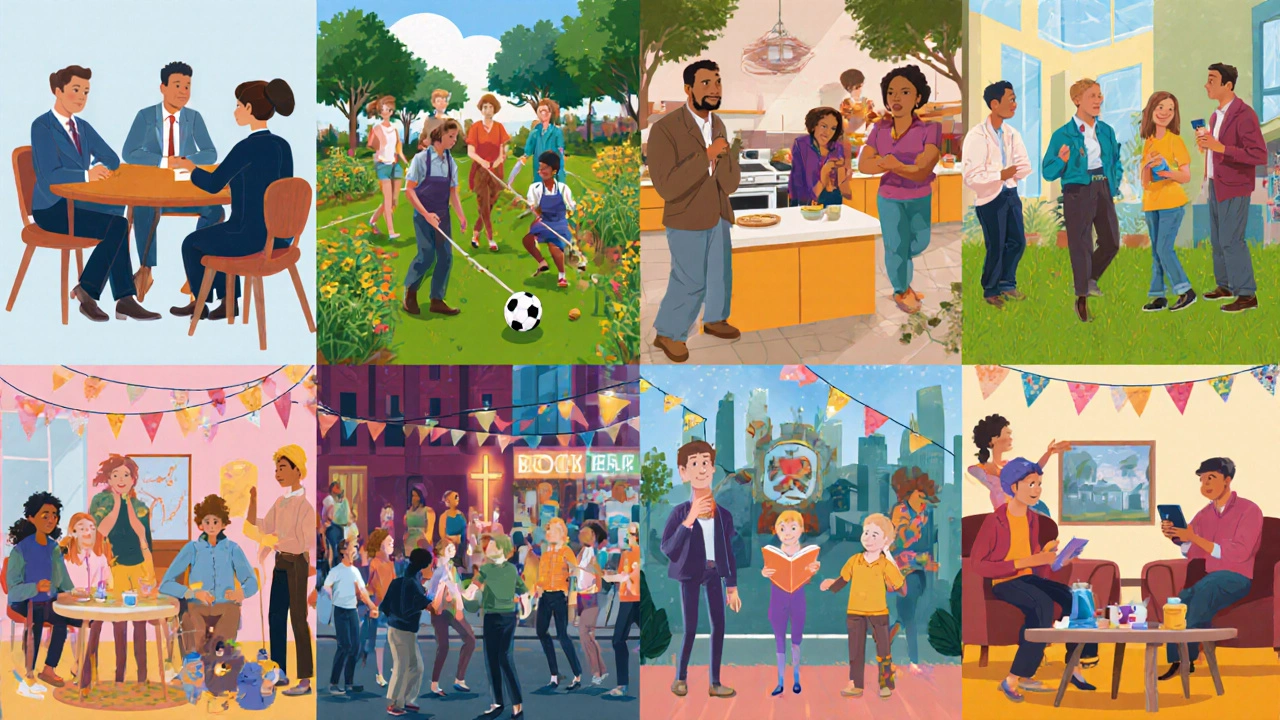Ever wondered where the bulk of adult friendships actually start? It’s not just random chance - most adults meet new friends in a handful of everyday settings. Knowing the hotspots can save you hours of awkward small talk and help you focus your social energy where it counts.
Why adult friendships matter
Research shows that strong friendships in adulthood boost mental health, lower stress, and even add years to your life. A adult friendships are close, supportive relationships formed after the teen years that provide emotional and practical benefits act as a buffer against loneliness, especially after major life changes like moving cities or changing jobs.
Top places adults meet friends
Below are the nine venues where most adults report forming new friendships, backed by surveys from the Australian Institute of Family Studies (2024) and the UK’s Office for National Statistics (2023).
- Workplace the primary setting for adult social interactions, where shared projects and daily routines create natural bonding opportunities. About 42% of adults cite a coworker as their newest friend.
- Volunteering organized community service that brings together people with a common cause, fostering quick trust and shared purpose. Volunteers are 1.8× more likely to report new friendships within three months.
- Sports clubs & fitness classes team or group physical activities that encourage regular contact and friendly competition. Weekly games or classes produce a 35% higher friendship conversion rate than sporadic events.
- Community courses & workshops skill‑based classes such as cooking, photography, or language lessons that attract like‑minded adults. Participants often bond over shared learning challenges.
- Religious or spiritual groups faith‑based gatherings that provide regular rituals and support networks. 28% of surveyed adults reported meeting a friend through a church or temple.
- Neighbourhood events local festivals, block parties, or resident meetings that create a sense of place. Proximity boosts the likelihood of repeated interaction.
- Online interest groups forums, hobby Discord servers, or Facebook groups where niche passions spark real‑world meet‑ups. Digital bridges often lead to coffee meet‑ups or joint outings.
- Book clubs & discussion circles structured literary gatherings that encourage deep conversation and personal sharing. The reflective nature of reading helps break down barriers.
- Parent groups play‑date co‑ops or school PTA meetings where parents bond over child‑related topics. Even non‑parents sometimes join for social support.

Comparison of venues
| Venue | Typical Contact Frequency | Initial Effort Required | Average Friendship Longevity |
|---|---|---|---|
| Workplace | Daily | Low (shared tasks) | 4‑6 years (if job stable) |
| Volunteering | Weekly‑monthly | Medium (commitment) | 3‑5 years |
| Sports clubs | 2‑3 times/week | Low‑Medium (join fee) | 2‑4 years |
| Community courses | Weekly | Medium (registration) | 1‑3 years |
| Religious groups | Weekly‑biweekly | Low‑Medium (attendance) | 5‑8 years |
| Neighbourhood events | Monthly‑quarterly | Low (show up) | 1‑2 years (unless continued) |
| Online interest groups | Variable | Low (sign‑up) | 0‑2 years (depends on meet‑ups) |
Tips to turn casual encounters into lasting friendships
- Show genuine curiosity. Ask open‑ended questions about hobbies, family, or recent experiences. People remember listeners.
- Schedule a follow‑up within a week. A quick coffee invitation cements the initial connection.
- Share a bit of yourself. Vulnerability signals trustworthiness and encourages reciprocal sharing.
- Participate consistently. Whether it’s a weekly yoga class or a monthly volunteer shift, regularity builds familiarity.
- Leverage small groups. A trio or quartet feels less intimidating than a one‑on‑one scenario for many adults.
- Use digital tools wisely. A friendly text after meeting keeps momentum without feeling intrusive.
- Be patient. Not every encounter will blossom; give friendships 3‑6 months to settle.

Common pitfalls to avoid
Even with the right venue, missteps can stall friendship growth.
- Over‑committing. Saying “yes” to every event can dilute quality time and lead to burnout.
- Focusing solely on convenience. Choosing a venue just because it’s nearby, without shared interests, often results in surface‑level ties.
- Ignoring boundaries. Pressuring someone to share personal details too early can backfire.
- Leaving without follow‑up. The “no‑contact” gap after an initial meeting is the biggest friendship killer.
- Relying only on digital chat. While online groups spark connections, in‑person meet‑ups solidify them.
Frequently Asked Questions
Can I make new friends after moving to a new city?
Absolutely. Start with neighbourhood events, local volunteer groups, or a coworker‑run social club. Consistent attendance and a proactive invitation for a coffee are key.
Is it okay to pursue friendships through online gaming communities?
Yes, especially if the game involves team play. Many gamers arrange in‑person meet‑ups after building rapport online. Just transition gradually and meet in a public place first.
How long does it typically take for a casual acquaintance to become a friend?
Research suggests 3‑6 months of regular interaction are needed for trust to develop enough for a genuine friendship.
Are single‑person activities (like reading) good for meeting friends?
They can be if you join a group version-book clubs, author talks, or library meet‑ups turn solitary hobbies into social opportunities.
What’s the best way to invite a new coworker for a hang‑out without sounding pushy?
Mention a shared interest you discovered at work, like a coffee shop you both like, and suggest a low‑key meet‑up: “Hey, I’m heading to Café Lumen after lunch-want to join?”
